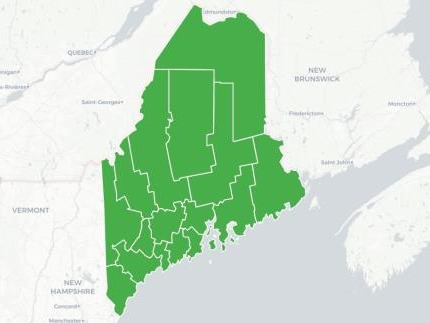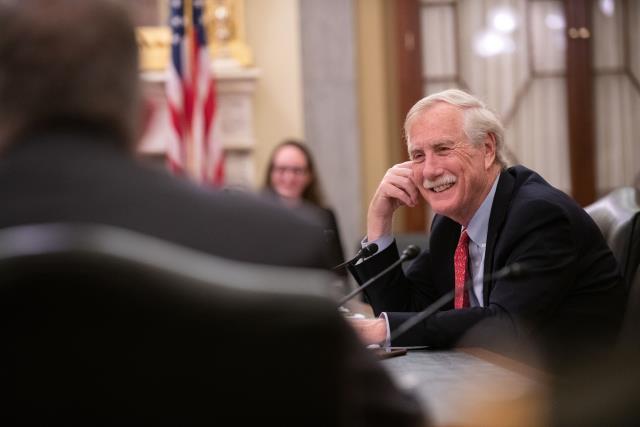Addressing Tragic, Senseless Gun Violence

As much as I don’t like starting off my updates to you on a down note, this moment in time doesn’t really leave much choice.
In just the last few weeks, the horrific, senseless shootings in Buffalo, New York and Uvalde, Texas have shattered hearts across the nation. As we all grieve for the victims and their families, the downright evil mass murders are pushing the ongoing threat of gun violence back into the forefront of our nation’s consciousness. These horrendous acts should be unimaginable, but unfortunately they have become a far too common fact of American life. This violence does not have to continue. We can, and must, do more to protect our communities.
I'm working with colleagues on both sides of the aisle to try and find commonsense gun safety solutions that curb the likelihood of these nightmares. This includes a bipartisan piece of legislation I've long supported with Republican Senators Rubio and Scott of Florida that would help states across the nation develop red flag laws. The bill creates a proactive process that can keep guns out of the hands of people who are displaying signs of emotional or mental distress, while still protecting Second Amendment and due process rights of law-abiding gun owners. While no single law will necessarily solve all these problems, these are essential first steps we must consider.
These tragedies have also made painfully clear the importance of confirming a permanent and effective Director of the Bureau of Alcohol, Tobacco, Firearms and Explosives (ATF) – which plays a critical role within our nation’s law enforcement community. The ATF Director is a vital leader in public safety – but since the role became a Senate-confirmed position in 2006, the Bureau has only had one permanent director, hindering its vital work.
This ongoing uncertainty cannot continue – the ATF needs a serious, non-partisan, experienced leader who can build strong relationships with stakeholders across the agency’s jurisdiction. After meeting with the White House’s nominee Steve Dettelbach, reviewing his record closely, and monitoring his testimony before the Senate Judiciary Committee, I am confident that he has the experience and temperament required to lead the ATF with distinction, and will vote to confirm him for this position.
In the past, Congress has failed to meet the moment following these acts of evil, and while it won't be easy, I hope this time will be different. We must find commonsense solutions that confront gun violence and protect our communities.
Tackling Rising Costs for Maine People

From gas tanks to groceries, families and businesses across Maine are struggling with rising prices, stagnant supply chains, and a higher cost of living. While these rising costs are mostly due to global factors outside of any one person's (or president's) control, it's clear that Congress can, and must, take action that helps lower costs for Maine people without choking our economy.
First, we need to address the supply chain crisis that is one of the driving forces behind rising costs. This includes passing the America Competes Act which would create a new office to closely monitor the status of the nation’s supply chain and respond to disruptions. The bipartisan legislation, which overwhelmingly passed the Senate, would also provide billions to prevent shortages of goods and boost American manufacturing – especially the high-tech semiconductors that are used in nearly every modern product. This is a win-win that would make us less reliant on foreign supplies and create new jobs across our communities.
We also need to make sure that prices aren't rising because of a lack of competition in certain industries. In the meatpacking industry for example, only four companies control almost the entire market – meaning they can hike up prices almost without consequence. Congress must update our antitrust laws for the 21st century so that price-gouging is less frequent, and so Maine people don't end up paying more than they should. We can also take direct steps to help more people enter these noncompetitive markets – like with my New Markets for State Inspected Meat and Poultry Act which would let local farmers and ranchers certify and ship their custom-slaughtered meat to consumers across state lines.
Addressing inflation also includes addressing workforce issues. Right now, labor shortages are rapidly driving up cost of labor, placing a burden on small businesses that have no choice but to pass those costs on to consumers. We simply do not have enough people to fill the jobs that our strong economy has created, especially in service industries Maine relies on like restaurants and tourism. I've been working to secure more visas for seasonal workers that will help fill these jobs, but long-term, we need comprehensive immigration policy that will bring new, legal workers into our economy that is desperate for labor.
Finally – perhaps where Maine people are feeling price rises the most – we need to find ways to lower costs at the pump. There's a long history of the President getting blamed for gas prices – which I don't think is quite fair. Instead, these prices represent a much simpler comparison between the supply of gas and the demand for gas. With Russia's invasion of Ukraine and a reduction of oil production during the COVID-19 pandemic limiting the supply of gas, prices have risen. To lower these prices in the short term, we need more production. That's why I've been urging top oil and gas executives to focus on this production instead of stock buybacks, and for the administration to be careful with exporting natural gas while American consumers see prices skyrocketing. In the long term we need to continuing the transition away from fuels that rely on volatile international markets and towards clean fuels here at home.
There are a lot of moving pieces, but I believe there are significant ways that Congress can work to fight inflation. It's one of the most pressing issues facing Maine people, and I'm hopeful that we can take action in the weeks to come. To dive deeper on the issue, for our Inside Maine podcast this month, I sat down with Dana Connors from the Maine Chamber of Commerce and Travis Blackmer from the UMaine Economics department to discuss what's driving these rising prices, and what we can do to address it. You can tune in HERE.
Getting Baby Formula Back on Shelves

No family should have to live in fear of their child’s food supply running out, but as the nation faces a serious shortage of infant formula, this is the unacceptable, heartbreaking situation facing far too many Maine families. Congress, the administration, and every part of the federal government needs to do more to get formula back on shelves as soon as possible and secure supply chains to prevent this type of crisis from happening again.
This is why I was glad to see President Biden sign the Access to Baby Formula Act, a bill I cosponsored, into law this month. The critical, bipartisan bill will help alleviate the nationwide shortage of baby formula by requiring major formula manufacturers to develop action plans and provides the FDA and USDA with flexibility to help address disruptions. It will also ensure that the almost seventeen-thousand Maine families who receive support from the Special Supplemental Nutrition Program for Women, Infants, and Children (WIC), are not restricted to a type or brand of formula – allowing these low-income families to purchase whatever is available in the store.
Together, between action from Congress, the White House, and the private sector, we will help Maine parents access the life-sustaining formula as soon as possible and end this crisis.
Protecting Fundamental Healthcare Rights for Women

At the start of this month, media reports indicated that the Supreme Court had drafted a decision that would overturn Roe v. Wade. If accurate, the draft Supreme Court ruling would be a dangerous, seismic shift in which the Court overturns half a century of established precedent and overrides the most basic, private rights of half the nation.
In light of this serious threat to Roe and the ability of millions of women to make decisions about their own health, safety, and lives, I voted for the Women’s Health Protection Act to secure these fundamental protections.
The Women’s Health Protection Act is not a radical change – in fact, it would have primarily maintained the status quo of the last 49 years of healthcare policy. I’ve closely examined this legislation and believe it preserves American women’s existing right to access critical, lifesaving care with the support of trained medical professionals, regardless of the Court’s upcoming ruling.
The bill would not undermine existing protections for healthcare providers who decline to perform abortions based on personal beliefs, while ensuring that women are still able to make decisions regarding their own body. Without these protections, this healthcare service would become more difficult to access for millions, and the lives of low-income Americans who cannot afford to travel to a state where abortion is legal will be put at risk.
Unfortunately, this effort fell short. I’m deeply frustrated that our commonsense bill to protect this essential right is not advancing. But despite this setback, we will continue looking for ways to protect the rights and healthcare of women across our country – because we cannot, and will not, return to a world that prevents women from making their own decisions about their bodies.
Expanding Maine Broadband and Making it Affordable

Early in the 20th century, America’s cities were booming. The era of electrification brought new jobs and opportunities to hubs like New York, Chicago, and Boston. Unfortunately, America’s rural areas didn’t see the benefits of these modern technological advancements; in fact, only ten percent of rural households had access to electricity by 1930. It took decades – and significant government effort – to help rural communities catch up.
A century later, a new technological shift is creating similar challenges for Maine’s rural communities. As the internet creates immense new economic, educational, and social opportunities for those with access to a high-speed connection, rural areas continue to be at risk of being left behind.
That’s why last year, we included the largest, most comprehensive investments in broadband infrastructure in both the American Rescue Plan and Bipartisan Infrastructure Law. Between these two historic pieces of legislation, Maine is expected to receive over $400 million in federal support for broadband expansion – close to the estimated costs to connect the entire state.
However, broadband access isn’t much good unless you can afford it. For many rural Maine households, some who may already be struggling to put food on the table, the current cost of internet is simply too high.
That’s why the Bipartisan Infrastructure Law included $14.2 billion for the new Affordable Connectivity Program (ACP). The program provides eligible low-income households with a $30 per month credit for their internet costs and support for connected devices. Almost four-hundred thousand Maine people – roughly a third of our state – qualify for the ACP, but only one out of every ten eligible Mainer is enrolled. If you think you may be eligible for ACP cost-savings, you can simply go to GetInternet.gov or call (877) 384-2575 to check your eligibility. It’s quick, easy, and could save you $30 dollars a month or help you gain access to an internet-connected device.
I wrote more about the progress being made on this priority for Maine in a recent column of mine that ran in the Piscataquis Observer. You can read the entire piece HERE.
Making Public Lands Easier to Access

America's National Parks are among the world's greatest treasures and deserve thoughtful stewardship that will preserve them for generations to come. As visitation to these natural wonders increases, the Senate National Parks Subcommittee has been working on a bipartisan basis to ensure our great outdoors have the modern resources they need to succeed.
Proper resources starts with proper funding – and right now, our parks don't have enough funding for staff or maintenance. From Acadia to Zion, National Park staff are the backbone of our entire parks system, they're critical to visitor experience and preservation. But as National Park attendance has skyrocketed, our staffing levels have stayed roughly the same – it just makes no sense. That's why Senator Steve Daines (R-Mont.) and I are calling for an increase to 23,000 full-time equivalent positions staffing for our parks, and pressed Secretary of the Interior Deb Haaland on the significant understaffing.
Senator Daines and I are also working to ensure that we increase resources for our parks, we can continue to help more people access these natural wonders by utilizing new technologies. This month, the Energy and Natural Resources Committee overwhelmingly supported the bipartisan Outdoor Recreation Act of 2022 (ORA), which included language from our “Waze for Parks” bill to show real-time park visitation levels and drive traffic to lesser-visited recreation areas nearby, along with language requiring federal land managers to provide digital “America the Beautiful” park passes. These efforts will help bring 21st century opportunities to our parks and make them easier to access than ever.
Continuing to Support the Ukrainian People

When Vladimir Putin ordered an unprovoked invasion of a peaceful, sovereign neighbor, he expected the war would be won in a matter of days – but months later, Ukraine stands strong. Putin’s ambitions have been thwarted by the stalwart leadership of President Zelenskyy and the unfailing bravery of the Ukrainian people.
But the fight is far from over, as Russia’s forces follow Putin’s war crime playbook by committing atrocities against civilians. The U.S. has stepped up throughout this crisis to provide Ukraine with the tools it needs to defend itself and care for its most vulnerable citizens. Earlier this month, we continued to make good on our commitment to the brave people of Ukraine and passed a $40 billion package to provide military and humanitarian aid. The bill provided:
- $9.1 billion to restock US equipment sent to Ukraine.
- $6 billion for the Ukraine Security Assistance Initiative to provide defense equipment, logistics support, and other assistance.
- $3.9 billion for European Command operations.
- $8.77 billion for the State Department’s Economic Support Fund for direct assistance to the Ukrainian government and other affected countries, including $760 million in global food aid.
- $4.35 billion for USAID international disaster assistance for humanitarian needs in Ukraine and other countries, including through emergency food and shelter.
- In addition, it provides $5M in additional funding for Inspector General offices to provide oversight, and requires reports to Congress by the Administration to account for defense items delivered to Ukraine.
Not only has Putin clearly made a military miscalculation, but he's also made a diplomatic one as well. Following Russia's attack on a free, independent neighbor, Finland and Sweden are taking steps to join the NATO alliance. These two countries, who are strategically positioned near Russia and the Arctic will strengthen the alliance and help prevent the conflict in Ukraine from spreading any further. I was proud to meet this month with the Prime Ministers of Sweden and Finland to express the Senate's support for their accession to NATO, and joined a bipartisan coalition in a joint statement of approval for the process.
I realize this is a lot of money, and a tremendous investment in Ukraine’s future – and I don’t take that lightly – but there’s so much at stake in this bloody conflict. Dangerous nations like China, Iran, and North Korea are watching how the free world steps up to defend its allies; we must send a clear message to the dictators and autocrats around the world.
Giving Veterans the Support They Deserve

For generations, America's men and women in uniform have made immense personal sacrifices to defend our country and our freedoms. Our nation owes them an unpayable debt of gratitude, and has a solemn responsibility to serve them with the same dedication with which they served us.
One of the most pressing issues facing our veteran community is an epidemic of suicides – with more veterans losing their life to suicide in 2019 alone than to combat in the Iraq and Afghanistan Wars combined. The data clearly shows that many of these tragic, preventable deaths happen in just a short period of time after leaving the service. If we can provide better support during this transition, we can reduce these tragedies significantly, which is why I'm urging top Pentagon officials to significantly increase the time, resources, and efforts they commit to our servicemembers as they leave active duty.
This won't completely solve the crisis of veteran suicide, but it would be a huge step in the right direction, and bring us closer to living up to the commitment we have to those who served.
Making Investments in Maine

Last year, Congress restored the practice of Congressionally Directed Spending that allows Members of Congress, and not just unelected federal agency officials, to direct funding to a state, locality, or non-profit group for projects that demonstrate civic and community value.
I was proud to help secure ninety-three 2022 Congressionally-Directed Spending (CDS) investments totaling $137,252,598 to support Maine people, organizations, and communities. To help you find the investments in your communities, we've launched a map that shows all the investments, where they're going, and what they'll do. You can check it out HERE.
May Policy Update

As a reminder, you can read more on my regularly updated press release page at king.senate.gov. Here are some other priorities I’ve been working on:
- Supporting meal delivery programs. Senator John Cornyn (R-Texas) and I introduced the Delivering Elderly Lunches and Increasing Volunteer Engagement and Reimbursements (DELIVER) Act, to support volunteer initiatives like Meals on Wheels. Read more HERE.
- Accelerating UMaine's offshore wind proposal. I urged Secretary of the Interior Deb Haaland to expedite federal consideration of the University of Maine’s offshore wind research program to ensure timely research into both the economic opportunities of the technology and potential impacts on other key industries, including fisheries. Read more HERE.
- Creating more housing on Mount Desert Island. With housing shortages on Mount Desert Island threatening economic growth in the region, I introduced bipartisan legislation to help create more affordable year-round and seasonal housing on the island. Read more HERE.
- Strengthening election infrastructure. I cosponsored legislation aimed at strengthening election administration across America. The Sustaining Our Democracy Act would provide $20 billion in mandatory federal funding over the next decade to help states and local governments support election administration. Read more HERE.
- Helping military spouses find employment. I joined with Senators James Lankford (R-Okla.), Kyrsten Sinema (D-Ariz.), and Jim Inhofe (R-Okla.) to introduce the Military Spouse Employment Act, which provides federal agencies clear authority to hire military spouses who want to serve their country through remote positions. Read more HERE.
In The News

Thanks for subscribing to my monthly newsletter! I would love to hear your ideas for how we can make Maine and our country a better place. Please feel free to reach out with any questions, comments, or concerns by visiting: https://www.king.senate.gov/contact —we look forward to hearing from you.
All the best, and stay healthy!

To unsubscribe to this e-Newsletter click HERE.
|